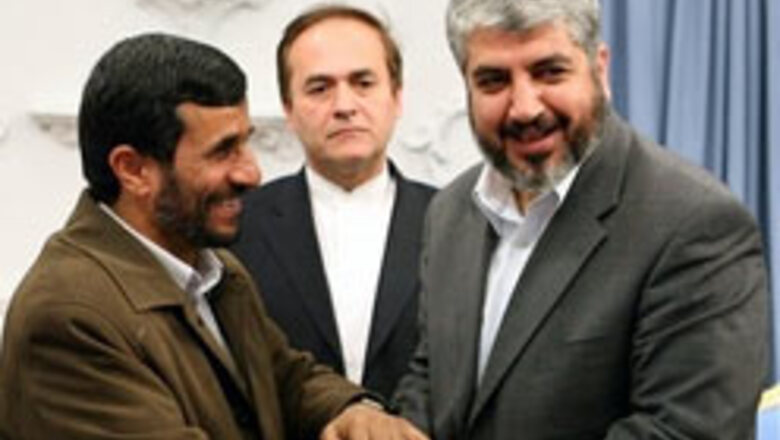
views
Jerusalem: Israel will not talk peace with the new Palestinian unity government, charging it does not recognise Israel and renounce violence, but there were initial signs the West would adopt a more conciliatory approach.
In a break from the Israelis, the US Consulate in Jerusalem said the US wouldn't rule out contact with non-Hamas members of the new government.
The Israeli Cabinet on Sunday endorsed Prime Minister Ehud Olmert's hard line, urging the West to maintain harsh economic sanctions imposed with last year's election of the militant Islamic Hamas.
"We can't have contact with members of a government that justifies resistance, or in other words, terror," Olmert said on Sunday, according to meeting participants.
Palestinians had hoped the new alliance between the moderate Fatah and Hamas would lead Israel and Western countries to lift the sanctions, urging the international community to give their new government a chance.
Israel has grown concerned that the tough international stance against Hamas could crumble following the group's power-sharing agreement with Fatah, and signs of that have begun to emerge.
Micaela Schweitzer-Bluhm, spokeswoman for the US Consulate, said Sunday the United States would likely maintain contact with non-Hamas members of the new government.
Norway, a major donor to the Palestinians, already has agreed to resume aid to the Palestinians. Britain and the United Nations also have signaled flexibility.
PAGE_BREAK
Palestinian officials urged Israel to reconsider.
"This statement continues the long-standing Israeli policy that says there is no Palestinian partner for peace," said Azzam al-Ahmed of Fatah, the new deputy prime minister. "Israel doesn't want to revive the peace process."
Olmert said he would maintain contacts with the moderate Palestinian president, Mahmoud Abbas of Fatah, who was elected separately and is not part of the new Cabinet. But he said any talks would be limited to humanitarian issues.
The new Palestinian platform appears to soften Hamas' militant stance. Though it refers to resistance "in all forms" to Israeli occupation, it also calls for consolidating and expanding a truce with Israel.
The platform appears to implicitly recognise Israel by calling for a Palestinian state on lands the Israelis captured in 1967, in contrast with Hamas' past calls to eliminate Israel altogether.
It also pledges to "respect" previous agreements with Israel and authorizes Abbas to conduct future peace talks.
Any future deal would be submitted to a national referendum, apparently taking away veto power from Hamas.
Almost as soon as the government was sworn in, however, divisions began to emerge in the Palestinian coalition. Hamas issued a statement Sunday distancing itself from the government: "We call on the national unity government to support the choice of resistance against the occupation."
Israel and the Quartet of Mideast peacemakers — the US, EU, UN and Russia — imposed sanctions against the Palestinians last year after Hamas was elected to power, labeling the Islamist group with a history of suicide bombings a terrorist group.
Despite widespread economic hardship, Hamas rejected the Quartet's conditions for explicit recognition of Israel.
During Saturday's swearing-in ceremony, Prime Minister Ismail Haniyeh of Hamas said the Palestinians maintained the right to resist occupation but also would seek to widen a truce with Israel. Abbas has said the deal is the best he can get from Hamas.
In Washington, White House National Security Adviser Stephen Hadley said Haniyeh's comments were "a little troubling" and said the US would watch the new government's deeds closely.
He called on the Palestinians to free an Israeli soldier captured by Hamas-allied militants last June and to halt rocket attacks out of the
Gaza Strip.
Arab leaders, meanwhile, pledged support for the unity government. The Jordanian and Saudi kings expressed hope it would lead to Palestinian independence, and the Arab League Secretary-General Amr Moussa called for an end to international sanctions.
The creation of the new Palestinian coalition came ahead of a March 28 Arab summit, where Mideast leaders are hoping to build momentum for a resumption of the peace process with Israel.
In addition to their struggle for international legitimacy, the Palestinians also could crumble over ideological differences and lingering enmity between Fatah and Hamas.
Abbas on Sunday named a Gaza strongman known for leading a crackdown on Hamas militants a decade ago as his national security adviser, presidential aides said.
The appointment puts Mohammed Dahlan, a top official in Abbas' Fatah, in a sensitive position as Palestinian leaders try to reform their myriad and competing security services. Hamas still has rocky relations with Dahlan.




















Comments
0 comment